- Large percentages of school board members and parents agreed that parents have a legal right to all medical and psychological information about their child
- Board members and parents agreed parents are best suited to determine how and where a child is educated
- Asked to grade the work of school boards, over two-thirds of school board members gave A’s and B’s, while approximately 58 percent of parents gave out A’s and B’s
This brief is the first of a three-part series on education polling in North Carolina. Part 1 shares the findings of school board member and parent polls. Part 2 will discuss results of the same polls concerning questions about teachers. Finally, Part 3 will share the findings of separate questions on governance and school funding.
Anyone who cares about K-12 education in North Carolina knows the last few years have not brought much to be happy about. A pandemic exposed the education system’s inability to deal with disruption. Government policies to close schools or significantly modify instruction stunted the academic, emotional, and social development of students. More recently, contentious battles over Critical Race Theory and gender identity have polarized classrooms and turned parents and school boards against each other.
Last September the John Locke Foundation commissioned polls of parents and school board members to take a snapshot of public opinion and better inform parents and school board members about public sentiment. Specifically, we wanted to identify where opinions of board members and parents converged or diverged and determine if school board members represented the views of the parents who elected them. That concern remained unresolved, however, given that so many school board members refused to answer our survey questions that we were unable to collect meaningful data.
Choosing not to answer is still an answer, and it provides a data point, but how exactly were we to factor it in? In the meantime, we were able to generate four articles from the survey of North Carolina parents (find articles here, here, here and here). Among the key findings of the Fall 2022 Civitas Parents Poll:
- 56 percent of respondents thought North Carolina was moving in the right direction on education, while 37 percent of respondents said North Carolina was on the wrong track.
- Approximately 45 percent of parents said the educational system “needs some changes and improvements.” Only 10 percent of respondents thought the public schools were “working reasonably well.”
- 45 percent of parents said schools spent too much time teaching sexual preference and gender identity.
- Over a third (35 percent) of respondents thought school boards should have less authority over the curriculum.
- Approximately 72 percent of parents said classrooms had become more politicized in the last five years.
Last fall’s poll results certainly reflected a charged and polarized environment. How do parents and school board members feel today about public education in North Carolina? Opinion polls offer one barometer of public sentiment. Another one is state and local elections. Local school board elections are certainly indicative of how the public feels about education.
School Board Elections
Last November elections were held in 83 of 115 school districts in North Carolina. Of those 83 school districts, partisan elections were held in 42 school districts, and nonpartisan elections were held in 41 districts.
After the election, of the 83 districts that had elections, the number of districts controlled by Republican majorities increased from 48 to 53 school districts, while the number of districts controlled by Democrats declined from 33 to 25. Republicans flipped six nonpartisan districts and held on to 47 of 48 school districts that had Republican majorities. Moreover, the number of split-control districts (in which each party has equal representation) increased from two to five. Overall, conservative candidates and pro-parent themes were strong in rural areas, while progressive candidates were strong in cities. School board elections in the suburbs were largely standoffs with small changes on each side but no flipped boards.
The Current Landscape
Several pertinent questions emerge from these developments. Do school board election results signify a shift in public sentiment? Is that sentiment reflected on school boards and in school policy? How do the views of parents and school board members converge or diverge on major issues? How have sentiments changed since last fall?
To answer these questions, the John Locke Foundation commissioned two more polls this spring: one of North Carolina parents and one of local school board members in North Carolina. The poll of North Carolina parents includes responses from over 500 parents and was administered April 25–27. The poll of North Carolina school board members includes responses from 112 members. It was administered from April 25–May 3. For information on poll methodology see the end of this article.
Poll Findings
Results from the school board member poll and parent poll are now available. This article will focus on responses to questions about the direction of North Carolina schools, perceptions about governance, and responses on how schools address controversial issues. Other forthcoming articles will focus on teachers, objectionable materials, and a few other matters.
Selected highlights and observations from the polls follow below.
Would you say education in North Carolina is headed in the right direction or on the wrong track?
Parents are more optimistic about the future of education in North Carolina, while board members are evenly divided
Regarding the question of whether education in North Carolina is heading in the right direction or on the wrong track, parents appear more optimistic than school board members. A full 59 percent of parents said North Carolina was on the right track, up 3 percentage points from 2022 (56 percent). Twenty-four percent of parents thought the state was on the wrong track, down 13 percentage points from 2022. Respondents who were “unsure” increased from 7 percent to 17 percent.
The positive sentiment was bipartisan. Among Republicans, 55 percent said North Carolina was on the right track (29 percent said wrong track). A higher proportion of Democrats (71 percent) said North Carolina is on the right track, with only 17 percent who said wrong track. Independent parents, however, were much more pessimistic and divided: 39 percent selected right track, while 33 percent said wrong track.
School board members were less optimistic and more divided. Less than half (48 percent) of school board members responded that North Carolina was on the right track. Another 47 percent of board members said North Carolina was on the wrong track. Republican board members selected wrong track (47 percent) by a slightly higher margin than right track (44 percent). Democrats chose right track by a larger margin (55 percent to 45 percent wrong track), while Independent board members were evenly split on the question (48 percent for each).
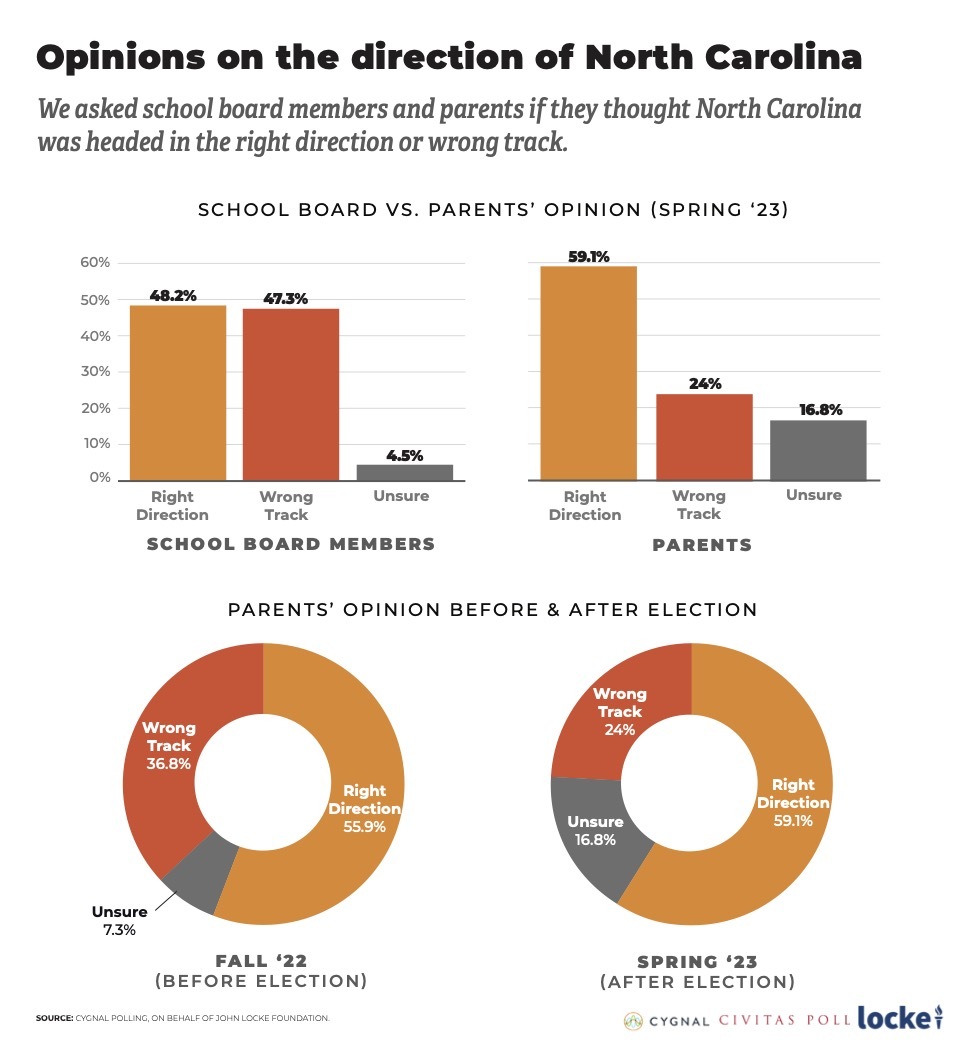
What grade would you assign to a school board to reflect the quality of their work?
School board members gave themselves higher grades than parents did, but grades from parents did improve significantly over 2022
Both polls asked respondents to assign a grade to the work of school boards. Board members awarded themselves higher grades than did the parents. Nearly half (49 percent) of board members awarded school boards with a B grade, and this grading was consistent among Republican and Democratic board members. Nineteen percent awarded A’s, and with A and B grades combined, over two-thirds (68 percent) of the grades awarded by school board members were A’s and B’s. Just over one in five board members (21 percent) gave school boards C grades, nearly 3 percent gave D’s, and nearly 3 percent, F’s.
Parents’ grades of the work being done by school boards were less generous. About one-third (nearly 34 percent) gave B’s, but a higher percentage (nearly 24 percent) awarded A’s. While 68 percent of school board members gave out A’s and B’s, only 57 percent of parents did. At the same time, 11 percent of parents handed out D’s and F’s, compared with only about 6 percent of school board members. Twenty-four percent of parents handed out C grades.
It’s worth noting that the grades parents awarded to school boards improved significantly in 2023. In 2022, only 32 percent of grades were A’s (9%) or B’s (23%), compared to 57 percent in 2023. Coincidentally, the percentage of middle and low grades given by parents declined from the previous year: C’s (24 percent vs. 38 percent in 2022), D’s (going from 15 percent to 8 percent), and F’s (falling from 9 percent to 3 percent).
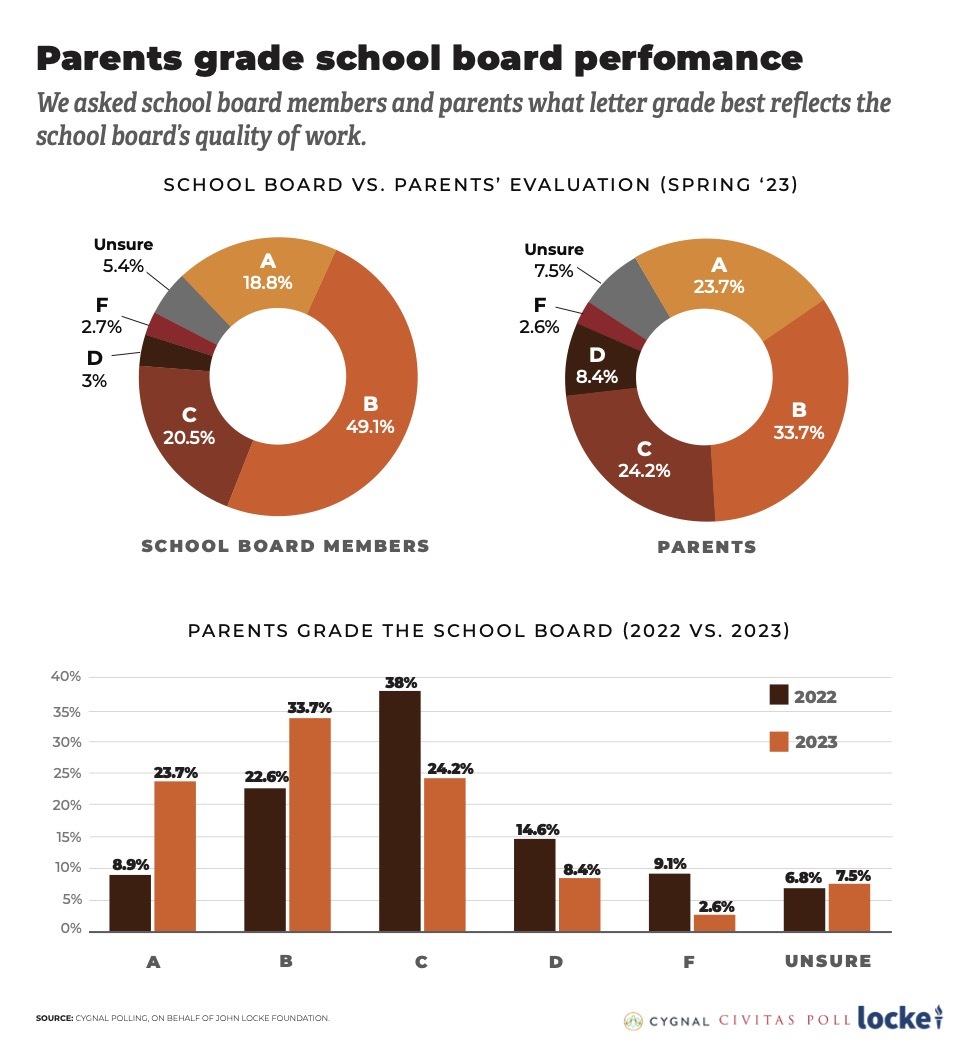
Who is best suited to determine how and where a child is educated?
Parents and school board members alike said parents are best suited to determine how and where a child is educated, but support for parents making educational decisions waned in 2023
We know where a child is educated significantly influences educational outcomes. Our polls asked school board members and parents who are best equipped to decide where a child goes to school.
Parents/Guardians was the most popular answer for both groups. Fifty percent of school board members chose parents/guardians, with strong support from Republican (58 percent) and Independent (65 percent) members. Support among Democrats was split three ways, with parents/guardians (35 percent) having a plurality. Among the other options, 27 percent of school board members opted for the local school board, and only 14 percent chose the State Board of Education. Only 5 percent apiece said the school principle or were unsure, and none opted for the state legislature.
When asked a similar question, 45 percent of parents chose parents/guardians as the most popular answer. The other options received small levels of support: the State Board of Education (18 percent), state legislature (11 percent), school principal (10 percent), local school board (9 percent), and unsure (7 percent).
While parents/guardians remained the most popular response among both groups, part of the story is how parental opinion changed from 2022 to 2023. Parental support for the option parent/guardians declined 11 points from the previous year. The second most popular option remained different for both groups. Twenty-seven percent of school board members selected the local school board, while 18 percent of parents chose the State Board of Education. As the top two parental responses for 2023 declined 11 and six points from 2022 levels, some parents added support for the state legislature (up 8 percentage points) and the school principal (up 7 percentage points).
What does it all mean? Support for parental decision-making far outweighed the other options in each poll. However, the strength of that support has waned in the past year. Whether that strength rebounds or takes another shape will have great impact on schools and how they are governed.
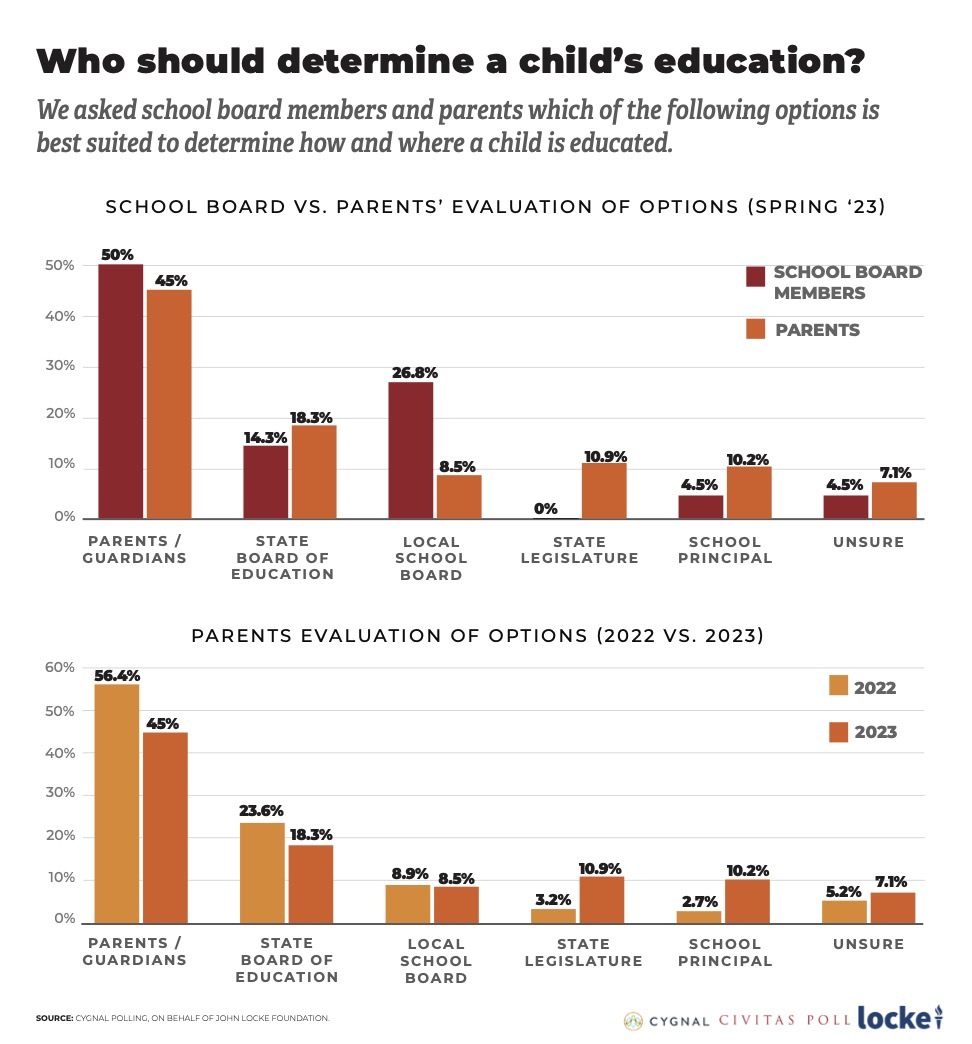
Our polls also asked parents and school board members about more controversial topics, such as politics in the classroom, gender identity, and access to a child’s medical information.
Have classrooms become more politicized in the last five years?
School board members strongly believe classroom instruction is more politicized, as do parents, though to a lesser degree than in 2022
A high percentage of school board members (83 percent) said K-12 instruction had become more political in the last five years. This finding spanned political and racial categories: 89 percent of Republicans, 75 percent of Democrats, 87 percent of Independents, and also 84 percent of whites and 79 percent of blacks. On the other hand, less than 2 percent of school board members said classroom instruction had become less political, and about 11 percent thought the level of politicization was unchanged.
When parents were asked the same question, a considerably lower percentage of respondents — 59 percent — said classroom instruction had become more political. In addition, 14 percent of parents said classroom instruction was less political, and over one in five respondents (21 percent) thought classroom instruction was neither more nor less political. Those numbers are significant for a variety of reasons. The percentage of parents thinking classroom instruction was more political had declined 13 percentage points from September 2022 (from 72 percent), and those thinking it had gotten less political had increased by 6 percentage points (from 8 percent).
Poll results revealed stark differences between parents and school board members over how they perceived politicization in the classroom. While 83 percent of school board members agreed classroom instruction had become more political, only 59 percent of parents thought the same — a hefty difference of 24 percentage points.
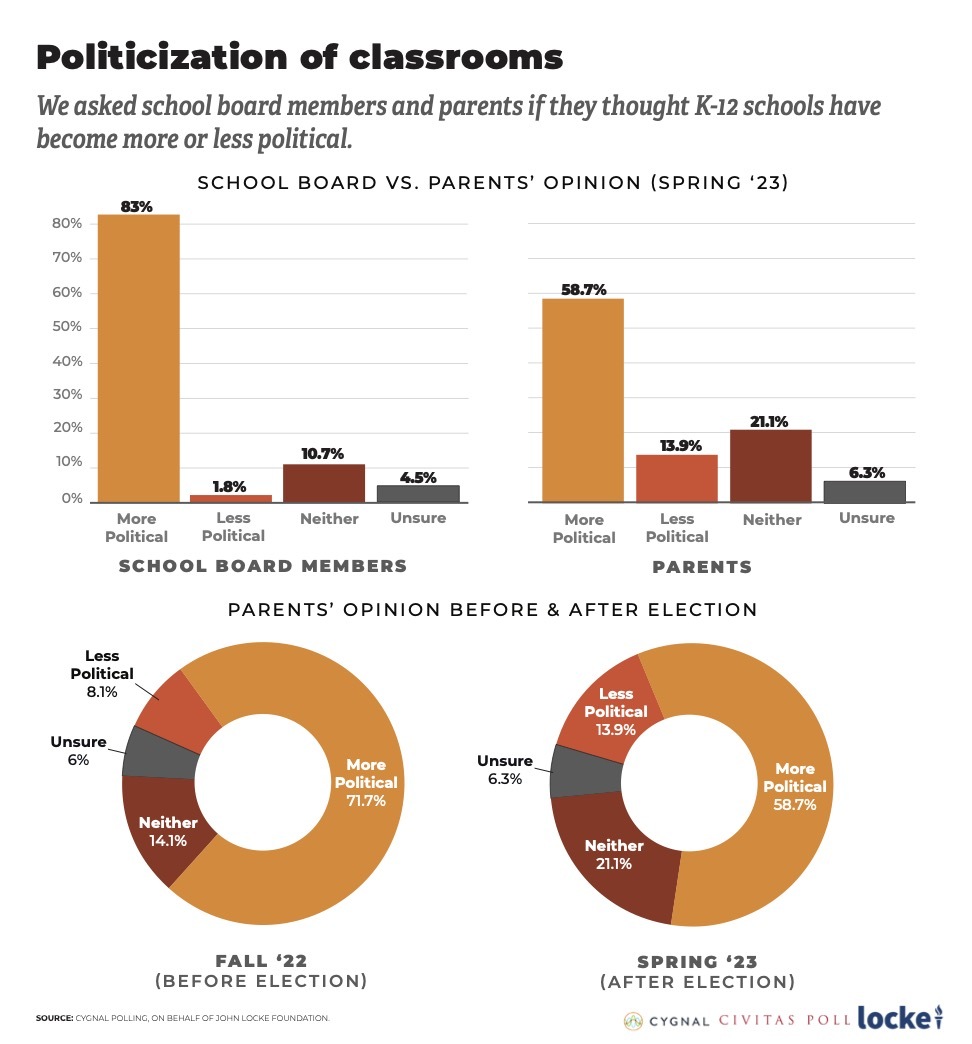
Do you agree with how schools handle issues of sex and gender identity?
The plurality of school board members thinks too much time is spent on sex and gender identity, but the plurality of parents no longer thinks too much time is spent on those topics
Asked their views on how schools are handling the topics of sexual preference and gender identity, a plurality of school board members (41 percent) said “too much time” is given to these topics. A strong majority (71 percent) of Republicans and the plurality of Independents (39 percent) thought too much time was spent on those topics, but only 8 percent of Democratic members did. Conversely, a plurality of Democrats (43 percent) thought schools spent the right amount of time on sexual preference and gender identity. The second most popular response among school board members was “unsure” with 31 percent, an unusual percentage for the category. Another 21 percent said “the right amount of time,” while only 6 percent thought “not enough time” was being spent on those topics.
Parents’ responses to the same question differed widely from school board members’ answers. Parents were near evenly divided among the “right amount of time” (30 percent), “not enough time” (30 percent), and “too much time” (28 percent). Those responses are a noticeable change from the Fall 2022 poll, in which the plurality of parents (45 percent) said too much time was spent on sex and gender identity.
Why parental opinion shifted and fractured into different areas is the other half of this story. It may be rooted in changes in school districts, it could reflect the results of the school board elections, or it could be the issues of sex and gender identity just ran their course and parents tired of dealing with them. The answer is beyond the scope of this article, but the issue certainly warrants additional investigation.
Poll results reveal a sizeable difference (13 percentage points) between parents and school board members over whether schools spent too much time on sex and gender identity (28 percent to 41 percent). There was, however, a dramatic, 17-point decline from last fall in the proportion of parents who thought “too much time” was spent on those topics. It was only the third most popular response among parents in 2023. Despite their near-even split in responses, parents also seemed more certain of their responses (only 12 percent answered “unsure” vs. 17 percent in 2022) than did school board members (31 percent unsure).
Even without a dominant response among parents to the question of time spent on sex and gender in the schools, there were big differences along political lines, showing how they think differently. The plurality of Republican parents (37 percent) said “too much time” was spent on these issues, the plurality of Democrats (43 percent) thought it was the “right amount of time,” and the plurality of Independents (47 percent) thought it was “not enough time.”
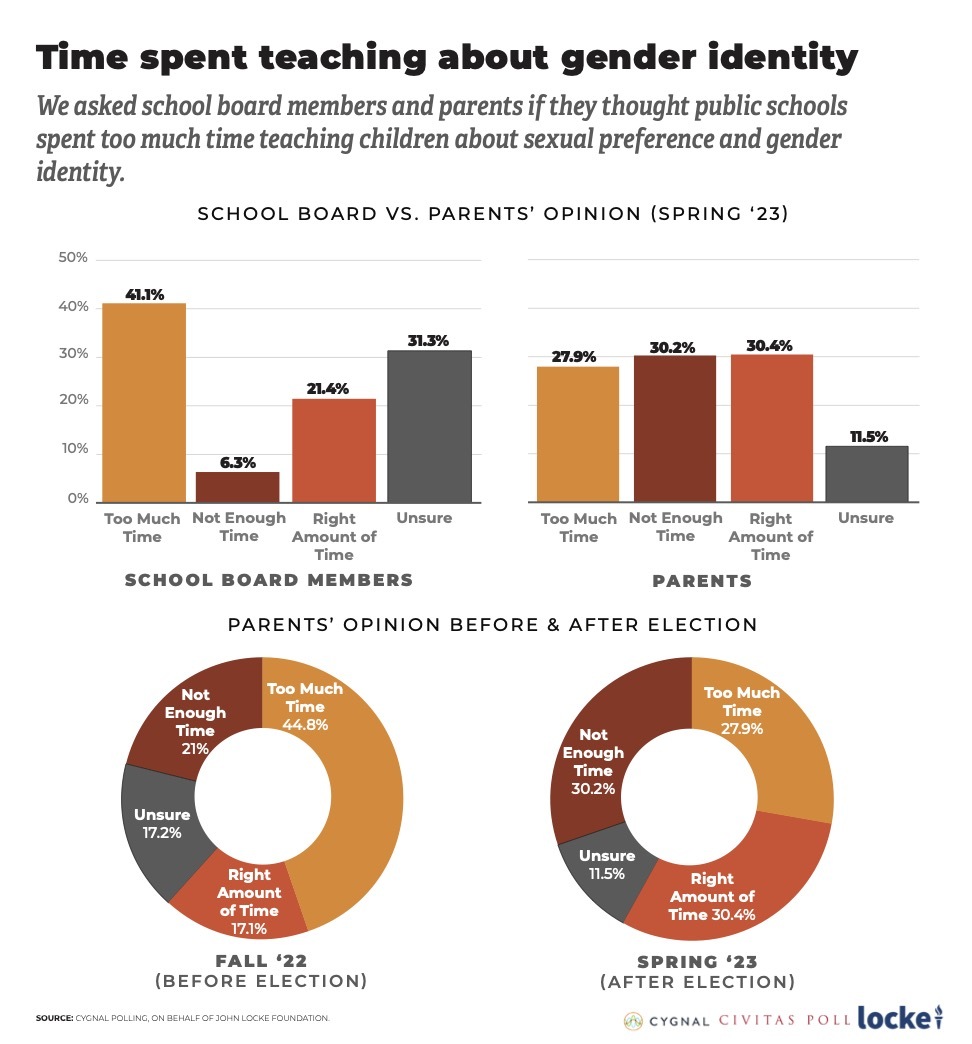
What is the best way for schools to address the issue of informing parents about issues regarding their child’s gender identity?
An overwhelming majority of school board members says parents have a right to medical and psychological information, as does a healthy majority of parents, though not as large as last year’s majority
Regarding how schools handle the issue of gender identity, the polls found the views of parents and school board members diverged in several areas.
Nearly 84 percent of school board members — a very strong number — thought parents have a legal right to all medical and psychological information about their child. It’s a position with strong support across the political spectrum, including 93 percent of Republican members, 78 percent of Democratic members, and 83 percent of Independent members. Less than 1 percent of school board members said parents should not be told about a child’s decision to transition in case parents might not agree with the child’s decision. Approximately 15 percent of school board members were unsure about how they would answer the question.
Parents were asked a similar question on how schools should inform them about a student’s gender identity. Sixty-one percent of parents said schools should be required to share medical and psychological information about their child because parents have a legal right to it. Thirty percent said schools should not be forced to tell parents about gender changes in case parents may not support a child’s decision. Nine percent of parents responded “unsure” to the question.
Two differences emerge from a quick comparison of these responses. First, an overwhelming majority of school board members (84 percent) thought parents have a legal right to all medical and psychological information about their child and thus should be notified about any child’s decision to transition. A smaller majority of parents (61 percent, which is still large) agreed. In 2022, however, a much larger majority of parents (87 percent) supported that assertion.
On the opposite end of the issue, the proportion of school board members who said that school districts should not share this information with parents in case they may not support a child’s decision to transition was less than 1 percent. A full 30 percent of parents, however, said that schools should not be forced to tell parents about gender changes (an increase of 7 percentage points from 2022). Along political lines, this assertion was supported by 28 percent of Republican parents, 33 percent of Democrats, and 27 percent of Independents.
While support for parents’ rights remains strong, the significant decline in support for parental rights is a concerning trend.
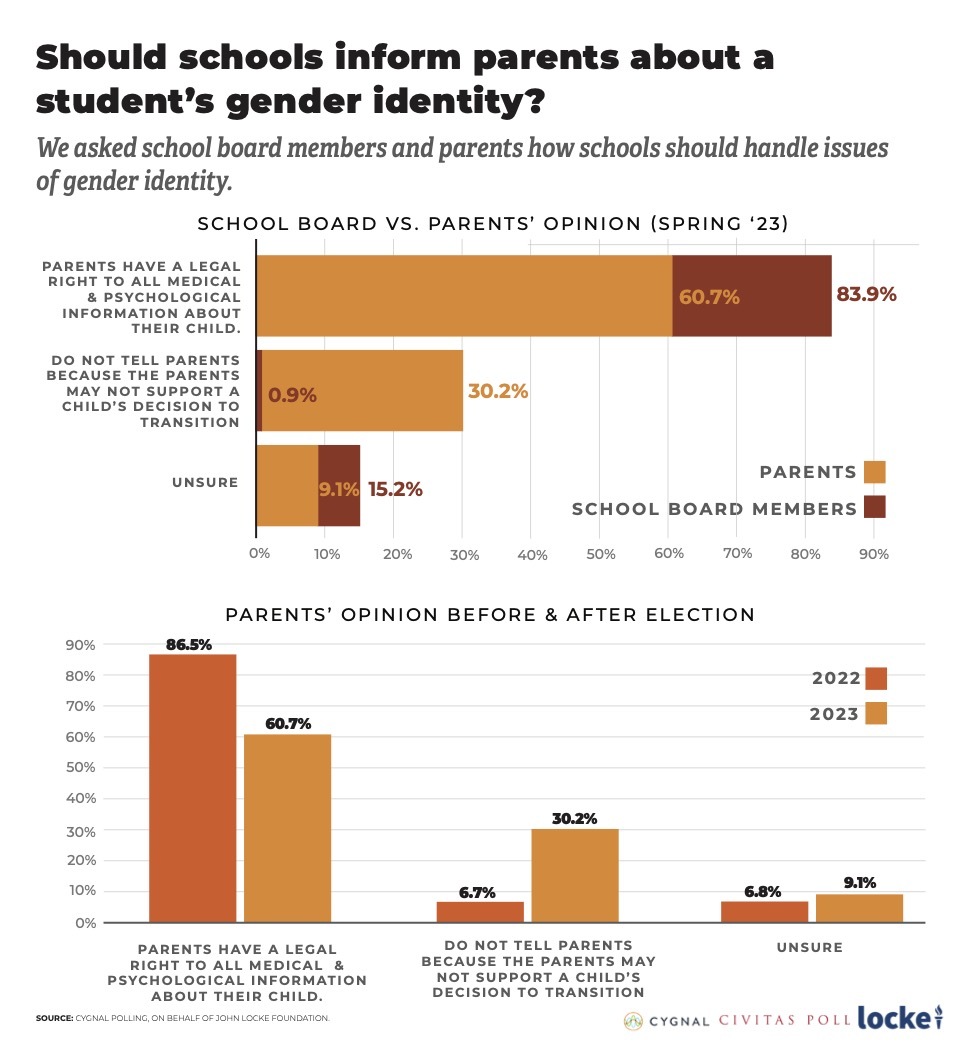
Conclusion
Local school boards are a staple of American democracy. In North Carolina, over 800 board members are elected to serve varying terms on 115 school boards throughout the state. School boards in North Carolina have three major functions: 1) maintain general supervision and control of all functions pertaining to the public schools, 2) enforce and execute school law, and 3) ensure that the administration of schools is done as efficiently and economically as possible.
It shouldn’t be forgotten that school boards are made up of elected individuals, who are ultimately responsible for representing the views of those they serve. In recent years, the job of a school board member has changed dramatically. School boards now suddenly find themselves at the vortex of social change, with many boards thrust into controversial decisions over such topics as school closures, critical race theory, and gender identity.
This article provides a snapshot of parental sentiment in Fall 2022 and Spring 2023 and of the views of school board members in the Spring 2023 as well. Changes in parental sentiment are highlighted. The article also provides areas where the views of parents and school board members converged or diverged regarding a variety of systemic and controversial issues.
The polls produced some interesting findings:
- Parents were more optimistic about the direction of education in North Carolina than were school board members.
- School board members graded themselves more generously than parents graded them. Parents’ grades of local school boards were lower but had improved significantly over 2022.
- School board members and parents still viewed parents as best equipped to decide where and how a child is educated, even though support for parental decision-making had waned considerably since 2022.
- Both groups said classrooms had become more politicized, but school board members did so at a much higher rate (24 percentage points) than did parents. Part of this gap owes to a 13-point drop since 2022 in the proportion of parents who said classrooms had become more politicized.
- Regarding controversial topics, the plurality of school board members thought too much instruction time was spent on topics of sex and gender. A similar plurality of parents thought the same in 2022, but parental support for that response declined 17 percentage points in the last eight months. In the latest poll, parents’ thoughts on this issue were split near evenly among whether schools gave these topics the right amount of time, not enough time, or too much time.
- Finally, large majorities of both groups believed parents have a legal right to a child’s medical and psychological information and records. Support for this right among school board members (84 percent) was much higher than it was among parents (61 percent). While a healthy number, parental support for this right declined 16 points since last fall. Also, a noteworthy 30 percent of parents thought schools should not be forced to tell parents if their child decides to change genders. Less than 1 percent of school board members agreed with that notion.
Poll findings suggest the dynamics of Fall 2022 have changed. Parents seemed less upset and frustrated with the public schools. Key indicators of support or opposition on a variety of systemic and controversial issues were markedly lower than they had been when polled last fall. Also notable is that parents were more optimistic about the future. The grades parents awarded school boards for performance improved, and also the intensity levels surrounding the issues of parental rights subsided.
So what accounts for the shift in parental sentiment? We can only speculate. First, we must acknowledge every issue has a shelf life. It’s only normal that the issues that contributed to packed school board meetings last fall would eventually move off the front pages.
The results of last fall’s school board elections also likely had an impact. Could the conservative shift in the composition of school boards have helped to tamp down controversies in various districts? That’s possible. Finding the reasons for the shift are important and certainly worth more investigation.
How well are school board members representing the views of those who helped elect them? It depends. In many areas, parents and school board members shared the same sentiments. There were areas in which their views diverged dramatically. Parents were more optimistic about the future than school board members; school board members gave school boards higher grades than parents; more board members also said schools were more politicized than parents. Moreover, while it was the majority view of both groups, a much larger majority of school board members said parents have a legal right to medical and psychological information about their child.
These findings are useful for many reasons. It’s helpful for assessing the influence of parents and the effectiveness of school boards. It is useful in helping to map policy positions, assessing the strength of ideologies and strategies for aiding policy development and implementation. Considering how the views of school board members and parents converge and diverge can do much to improve the governance of our schools, boost parental satisfaction with our schools, and ultimately lead to better schools. For those reasons, policymakers, parents, and the public would do well to review these pages.
Methodology
The School Board Member survey was conducted April 25–May 3, 2023, with 112 North Carolina school board members. North Carolina school board members were interviewed via email-to-web invitation. No demographic weighting occurred. The margin of error for the school board member poll was +/- 9.2 percent.
The Parents survey was conducted April 25–27, 2023, with 520 North Carolina school parents. The parents were interviewed via an online panel. This survey sample was lightly weighted to reflect a representative sample of the population. The margin of error for the school board member poll was +/- 4.3 percent.


